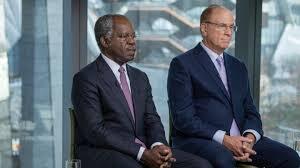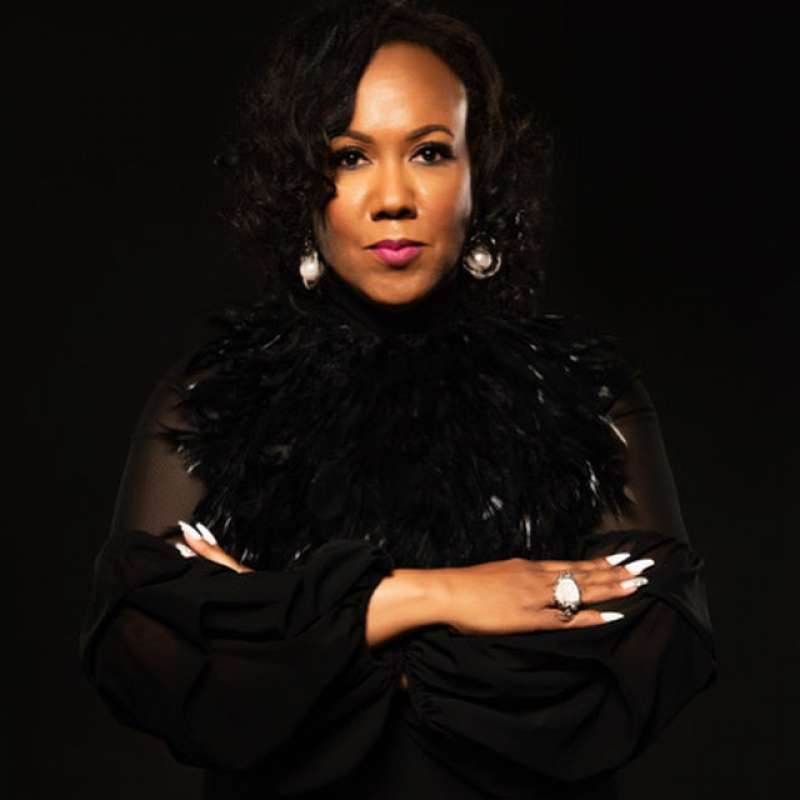-

10 Horrifying New Allegations Against P. Diddy Revealed
-

The legendary Katt Williams, hailed by many as the greatest comedian alive, joins Shannon Sharpe at Club Shay Shay for an explosively candid conversation.
katwilliams
-

Steve Harvey defends his stance on claiming his wife "belongs" to him
-

Baltimore, MD – June 2025
When it comes to business, some people talk, and some people execute. Alexis Coates is firmly in the second camp.
In his new book, 12 Great Business Principles, Coates breaks down the timeless, battle-tested rules that every entrepreneur needs to build and scale a real business — not social media smoke and mirrors, but the kind of businesses that pay dividends for decades and leave generational impact.
“Business isn’t complicated,” says Coates. “It’s discipline, decision-making, and delivering value consistently. This book simplifies what too many so-called experts try to overcomplicate.”
Drawing from years of hands-on experience — from founding multi-million dollar companies to closing real M&A deals — Coates distills core principles around:
-
Leadership & Discipline: How to lead from the front
-
Financial Mastery: Cash flow first, debt second, equity third
-
Execution: Why speed matters, but precision matters more
-
Legacy Building: The game is played for your children’s children
-
Deal Making: Negotiation tactics used in the real boardroom
And much more. This isn’t theory. It’s the hard-earned wisdom of a man who’s lived it.
But that’s not all.
Coates has also launched a brand new podcast: Alexis Coates: From The Boardroom — where he sits down with entrepreneurs, investors, dealmakers, and legacy builders to pull back the curtain on how real wealth is created. No fluff. No filters. Just strategy, experience, and high-level conversations.
Both the book and the podcast are designed to help serious entrepreneurs cut through the noise and build empires that stand the test of time.
Copies of 12 Great Business Principles are now available for purchase directly.
To order your copy, email: This email address is being protected from spambots. You need JavaScript enabled to view it.
Seats are filling for podcast guest spots, partnership inquiries, and collaborations. Stay connected with Alexis Coates as he builds one of the most talked-about business movements of 2025.
(BBR) Donald Trump's policies had a range of effects on the international shipping business, with some direct and indirect implications for global trade, maritime operations, and logistics. His "America First" approach was central to his administration’s strategies, and several key areas of focus had a notable impact:
1. Tariffs and Trade Wars
One of the most significant aspects of Trump's policies was the trade war, particularly with China. The administration imposed tariffs on billions of dollars' worth of Chinese goods, and China responded with tariffs on American products. This had several effects on international shipping:
-
Disrupted Shipping Routes: Tariffs led to shifts in trade routes and a reconfiguration of global supply chains, as companies sought to avoid high tariffs by sourcing goods from other countries.
-
Increased Costs: The tariffs on Chinese imports, for example, increased the cost of shipping goods to the U.S. This also affected the shipping industry as costs of materials, shipping rates, and supply chains were impacted.
-
Trade Volume Fluctuations: The trade tensions resulted in fluctuating shipping volumes, as demand for some goods dropped while others (like electronics or industrial goods) saw increased shipping requirements due to the tariff changes.
2. Deregulation of Shipping and Maritime Laws
Trump's administration favored deregulation across many sectors, including shipping. This had the following impacts:
-
Reduction in Environmental Regulations: The Trump administration rolled back some of the Obama-era environmental regulations, including those that required stricter emissions standards for ships. This led to fewer restrictions on the shipping industry's environmental footprint, although it raised concerns from environmental groups.
-
Streamlining Regulations: The administration pushed for reducing regulations in the maritime industry, aiming to make it easier for U.S. shipping companies to operate both domestically and internationally.
3. Tax Cuts and Economic Policies
The 2017 Tax Cuts and Jobs Act, which slashed corporate tax rates, had significant indirect effects on shipping:
-
Increased Investment in Shipping: Lower corporate tax rates meant companies, including those in the shipping and logistics sectors, had more capital to invest in fleet expansion, technology, and other maritime-related infrastructure.
-
Incentives for U.S. Shipping Companies: The tax cuts allowed U.S. shipping companies to be more competitive in the global market. However, it also meant that foreign competitors could adjust their pricing strategies, potentially affecting U.S. companies' market share.
4. Immigration Policies and Labor Force
Trump's strict immigration policies, including reducing the number of foreign workers, had implications for the shipping industry:
-
Labor Shortages: The shipping industry, which relies on a global workforce, faced challenges in terms of availability and cost of labor. Restrictions on foreign workers, especially in logistics and port operations, created some strain on labor supply, affecting the movement of goods.
-
Manpower Costs: Some shipping companies faced higher labor costs in the U.S. due to the reduced influx of immigrant workers. This increased the overall cost of doing business, particularly for port operations and shipping services.
5. Impact on Global Alliances and Trade Agreements
Trump’s policies aimed at renegotiating major trade agreements, like NAFTA (replaced by the USMCA), and withdrawing from others, such as the Trans-Pacific Partnership (TPP), which had mixed results on the shipping industry:
-
Reshaped Trade Routes: The renegotiation of trade agreements altered international shipping patterns and market opportunities. For instance, the USMCA focused on North American trade, potentially boosting cross-border shipping.
-
Disruption in Global Shipping Partnerships: The U.S. pulling out of agreements like TPP led to the shifting of trade alliances and affected long-term shipping contracts, particularly in Asia and the Pacific.
6. Impact on Global Shipping Regulations and Relations
-
China-U.S. Trade: The ongoing tensions with China affected the shipping of goods between the U.S. and China, disrupting the flow of goods and influencing the shipping costs on the Asia-U.S. trade route. The tariffs also forced companies to explore alternative shipping strategies, shifting trade flows to different regions or finding ways to circumvent tariffs.
-
International Trade Balance: Trump’s push for reducing the U.S. trade deficit led to a reevaluation of trade policies, and this created uncertainty for global shipping companies that rely on stable trade relations.
7. Environmental Considerations
Trump’s stance on environmental policies included withdrawing from the Paris Climate Agreement and rolling back certain environmental protections:
-
Shipping Emissions: The decision to withdraw from global climate agreements allowed U.S. shipping companies to avoid stricter emissions regulations that could have impacted the industry, although this came at the cost of international reputation and cooperation on global climate efforts.
8. COVID-19 and Shipping Under Trump
The pandemic occurred during Trump's last year in office, and it had an overwhelming impact on global shipping:
-
Disruption of Global Supply Chains: Trump's handling of the pandemic, particularly his stance on lockdowns and economic recovery, had an indirect effect on global shipping as supply chains faced bottlenecks and disruptions, especially in China, which is a major hub for global manufacturing.
-
Shipping Demand Fluctuations: The pandemic also led to shifts in shipping demand, with a notable increase in container shipping for consumer goods, while oil tankers saw lower demand due to reduced travel and economic activity.
Summary
Trump’s policies had a mixed effect on international shipping. On one hand, tariffs and trade wars disrupted global supply chains and trade volumes, leading to shifts in shipping patterns. On the other hand, deregulation and tax cuts presented opportunities for U.S. shipping companies to grow and expand, albeit in a more competitive global market. The COVID-19 pandemic further complicated matters, although Trump’s approach to international relations and trade agreements shaped the landscape in the years prior. Ultimately, the shipping industry had to adapt to evolving regulations, trade dynamics, and economic policies, all under the banner of "America First."
Baltimore, MD – March 30, 2025 – Laundrifi, a cutting-edge laundry and dry cleaning service, is excited to announce its launch in Baltimore, Maryland. Designed for those who'd rather spend time on anything but laundry, Laundrifi simplifies the chore with a seamless, tech-driven experience.
How It Works:
Schedule a Pickup: Customers can choose a convenient pickup time via the Laundrifi website, app, or by texting 646-982-4795.
We Pick It Up: The Laundrifi team collects laundry free of charge.
Professionally Cleaned: Garments are sorted, washed, dried, and folded with meticulous care.
Delivered to Your Door: Fresh, folded laundry is returned promptly.
Services Offered:
Wash & Fold: $1.50 per pound (subscription options available for savings).
Wash & Hang Dry: $1–$5 per item.
Dry Cleaning: Coming soon – Priced per item with a 48-hour turnaround.
Launder & Press: Coming soon – $3.50–$6.50 per item.
Mend & Repair: Coming soon – Fixes for zippers, buttons, and more.
Shoe Cleaning Service: Coming soon.
The Laundrifi Difference:
Free Same-Day Pickup & Next-Day Delivery – Convenience at no extra cost.
7 Days a Week – You Choose the Time – Flexible scheduling to suit busy lifestyles.
Eco-Friendly Detergents & Processes – Commitment to sustainability.
Real-Time Order Updates & Tracking – Stay informed every step of the way.
"Throw in the towel and spend your time doing things you love – aka not laundry," says the Laundrifi team. "We're here to take a load off and provide Baltimore residents with a hassle-free laundry experience."
Laundrifi currently serves the Baltimore area. Residents can check availability and schedule their first pickup by visiting laundrifi.com.
For questions or assistance, text 646-982-4795 or email This email address is being protected from spambots. You need JavaScript enabled to view it..
About Laundrifi
Laundrifi is a modern laundry and dry cleaning service dedicated to simplifying the process of getting laundry done. With user-friendly scheduling, professional care, and eco-friendly practices, Laundrifi aims to revolutionize the way people think about laundry day.
Follow Us:
Instagram: @laundrifi
Facebook: Laundrifi
Pinterest: Laundrifi
Hashtags:
#Laundrifi #LaundryService #BaltimoreLaundry #WashAndFold #LaundryDay #LaundryPickup #CleanClothes #FreshLaundry #DryCleaning #LaundryDelivery #LaundryLife #LaundryMadeEasy #EcoFriendlyLaundry #LaundryDoneRight
(BBR) Karenthia A. Barber is a distinguished consultant, speaker, and strategist based in Baltimore, Maryland. With over three decades of experience, she has significantly influenced the realms of business, education, and politics.
As the Founder and Chief Strategist of Professional Development Associates, LLC, Ms. Barber leads a consulting practice specializing in management consulting, diversity, equity, and inclusion, organizational development, training, and government relations services. Her firm has collaborated with a diverse clientele, including federal and state agencies, corporate entities, and non-profit organizations, providing services such as workshops, seminars, motivational speaking, staff retreats, and coaching.
Beyond her consulting endeavors, Ms. Barber serves as an adjunct faculty member and holds positions on various boards. In 2023, she was appointed by Maryland Governor Wes Moore to the prestigious Port Commission of Maryland, marking a significant milestone in her career. Her academic credentials include undergraduate studies at the University of Pittsburgh and graduate work at Penn State University. She is also an alumna of Leadership Maryland and Coach University, underscoring her commitment to continuous personal and professional development.
Ms. Barber's contributions have been widely recognized. She has been honored with The Maryland Daily Record's Top 100 Women in Maryland award in both 2016 and 2022. Additionally, she has received the Gold Leadership Award from Leadership Maryland and the Living Legend Award from the National Association of Negro Professional and Business Women's Clubs. Her Alma mater, the University of Pittsburgh honored her with a Distinguished Alumni award. Her affiliations include life membership in Alpha Kappa Alpha Sorority, Inc., and the Baltimore (MD) Links.
Throughout her career, Ms. Barber has demonstrated a profound ability to connect with individuals and organizations, offering insights into leadership, motivation, communication, conflict management, and community engagement. Her dedication to fostering diversity, equity, and inclusion has made a lasting impact on the communities and organizations she serves.
Karenthia A. Barber is a distinguished consultant, speaker, and strategist based in Baltimore, Maryland. With over three decades of experience, she has significantly influenced the realms of business, education, and politics.
As the Founder and Chief Strategist of Professional Development Associates, LLC, Ms. Barber leads a consulting practice specializing in management consulting, diversity, equity, and inclusion, organizational development, training, and government relations services. Her firm has collaborated with a diverse clientele, including federal and state agencies, corporate entities, and non-profit organizations, providing services such as workshops, seminars, motivational speaking, staff retreats, and coaching.
Beyond her consulting endeavors, Ms. Barber serves as an adjunct faculty member and holds positions on various boards. In 2023, she was appointed by Maryland Governor Wes Moore to the prestigious Port Commission of Maryland, marking a significant milestone in her career. Her academic credentials include undergraduate studies at the University of Pittsburgh and graduate work at Penn State University. She is also an alumna of Leadership Maryland and Coach University, underscoring her commitment to continuous personal and professional development.
Ms. Barber's contributions have been widely recognized. She has been honored with The Maryland Daily Record's Top 100 Women in Maryland award in both 2016 and 2022. Additionally, she has received the Gold Leadership Award from Leadership Maryland and the Living Legend Award from the National Association of Negro Professional and Business Women's Clubs. Her Alma mater, the University of Pittsburgh honored her with a Distinguished Alumni award. Her affiliations include life membership in Alpha Kappa Alpha Sorority, Inc., and the Baltimore (MD) Links.
Throughout her career, Ms. Barber has demonstrated a profound ability to connect with individuals and organizations, offering insights into leadership, motivation, communication, conflict management, and community engagement. Her dedication to fostering diversity, equity, and inclusion has made a lasting impact on the communities and organizations she serves.
(BBR) Artificial Intelligence (AI) is rapidly transforming industries worldwide, presenting both significant opportunities and challenges. For African American businesses, understanding and adapting to AI's evolving landscape is crucial for sustained growth and competitiveness.
Opportunities for African American Businesses
A recent survey indicates that approximately 84% of Black business owners are integrating AI into their operations. The applications vary, with 39% utilizing AI for idea generation and inspiration, 36% enhancing customer service, and 35% focusing on data analysis to inform strategic decisions. This widespread adoption underscores a proactive approach to leveraging technology for business advancement. ASBN Small Business Network
Moreover, AI's potential to drive economic growth is substantial. McKinsey estimates that generative AI could contribute between $2.6 trillion to $4.4 trillion annually to the global economy by 2040. If African American businesses can harness even a fraction of this potential, it could lead to significant economic empowerment and job creation within the community. Forbes
Challenges and Risks
However, the AI landscape also presents challenges. There's a concern that without intentional strategies, AI could widen the economic gap, potentially reducing the annual income of Black households by $43 billion. This projection highlights the risk of being marginalized in an AI-driven economy if proactive measures are not taken. McKinsey & Company+1Forbes+1
Additionally, certain sectors with high African American employment, such as customer service, food services, and production, are particularly susceptible to automation. The proliferation of AI in these areas could lead to job displacement, disproportionately affecting Black workers. Black Voice News
Strategic Recommendations
To navigate these opportunities and challenges effectively, African American businesses and professionals should consider the following strategies:
-
Invest in AI Education and Training: Developing AI literacy is essential. Engaging in courses and workshops can equip individuals with the skills needed to implement and manage AI solutions effectively.
-
Participate in AI Policy Discussions: Active involvement in conversations about AI ethics and policies ensures that the unique perspectives and needs of the African American community are considered in AI development.
-
Collaborate with Tech Innovators: Building partnerships with tech companies and startups can provide access to cutting-edge AI tools and platforms, fostering innovation within African American-owned businesses.
-
Advocate for Inclusive AI Practices: Supporting initiatives that promote diversity in AI development helps mitigate biases and ensures that AI systems serve all communities equitably.https://tarikmoody.com
Conclusion
AI's impact on African American businesses is multifaceted, offering both significant opportunities for innovation and growth, as well as challenges that require thoughtful navigation. By embracing AI strategically and inclusively, African American entrepreneurs and professionals can position themselves at the forefront of this technological revolution, ensuring that the benefits of AI are widely shared and contribute to closing, rather than widening, economic disparities.

BlackRock has agreed to buy GIP for $12.5 billion. Larry Fink, BlackRock Chairman and CEO and Adebayo Ogunlesi, Global Infrastructure Partners Chairman and CEO tell us why this is the golden age of infrastructure.
In the grand tapestry of global finance, few threads are as compelling as the journey of Adebayo Ogunlesi, a Nigerian-born visionary who ascended to the pinnacle of American enterprise. Simultaneously, the recent acquisition of strategic Panama Canal ports by BlackRock underscores a shifting landscape in international infrastructure ownership. Let's delve into these intertwined narratives.
Adebayo Ogunlesi: From Nigerian Roots to American Financial Zenith
Born on December 20, 1953, in Sagamu, Nigeria, Adebayo "Bayo" Ogunlesi was destined for distinction. His father, Theophilus O. Ogunlesi, holds the honor of being Nigeria's first professor of medicine. This foundation of academic excellence propelled Ogunlesi to King's College in Lagos and subsequently to Oxford University, where he earned a B.A. with first-class honors in Philosophy, Politics, and Economics. His academic journey culminated with both a J.D. magna cum laude from Harvard Law School and an M.B.A. from Harvard Business School.
Ogunlesi's professional odyssey began as a law clerk to U.S. Supreme Court Justice Thurgood Marshall. He then transitioned to the corporate law sphere with Cravath, Swaine & Moore in New York. In 1983, he embarked on a notable tenure at First Boston (later Credit Suisse First Boston), where he advised on a Nigerian gas project. His acumen led him to helm the Global Energy Group and, by 2002, the Investment Banking Division. In 2006, Ogunlesi founded Global Infrastructure Partners (GIP), a private equity firm specializing in infrastructure investments. Under his stewardship, GIP acquired significant assets, including stakes in London City Airport, Gatwick Airport, and Edinburgh Airport.
The crescendo of Ogunlesi's career was marked by BlackRock's acquisition of GIP in January 2024 for approximately $12.5 billion. This transaction not only augmented BlackRock's infrastructure portfolio but also cemented Ogunlesi's status as the wealthiest African immigrant in America, with a net worth estimated at $2.4 billion.
BlackRock's Strategic Acquisition: Navigating the Panama Canal
In a move resonating across geopolitical and economic spheres, BlackRock, in collaboration with Global Infrastructure Partners and Terminal Investment Limited, agreed to acquire a 90% stake in the Panama Ports Company from Hong Kong's CK Hutchison Holdings for $22.8 billion. This acquisition encompasses the Balboa and Cristobal ports, strategically positioned at either end of the Panama Canal.
The impetus for this transaction stems from heightened U.S. concerns over Chinese influence in critical infrastructure. President Donald Trump lauded the deal, asserting efforts to "reclaim" the Panama Canal. However, Panamanian President José Raúl Mulino refuted these claims, emphasizing that the canal remains under Panamanian sovereignty.
This acquisition signifies BlackRock's largest foray into infrastructure, aligning with its strategy to diversify and expand its global footprint. The deal also reflects a broader trend of U.S. entities seeking greater control over strategic international assets amid evolving geopolitical dynamics.
Interwoven Destinies: Ogunlesi and the Panama Canal
The convergence of Ogunlesi's leadership and BlackRock's strategic maneuvers epitomizes the intricate dance of individual ambition and institutional strategy. Ogunlesi's trajectory from Nigeria to the helm of global infrastructure investments mirrors the aspirations of many immigrants who reshape industries and economies. Simultaneously, BlackRock's assertive acquisition of Panama Canal ports underscores the shifting paradigms in global infrastructure ownership and the perpetual interplay between politics and commerce.CNN
In essence, the narratives of Adebayo Ogunlesi and BlackRock's Panama Canal acquisition are emblematic of a world where borders blur, and opportunities beckon those poised to seize them. They remind us that in the realms of finance and infrastructure, visionaries like Ogunlesi not only navigate but also chart the courses that others follow.
(BBR) Building a successful business requires immense dedication, strategic planning, and a thorough understanding of potential pitfalls. Unfortunately, not every entrepreneurial venture achieves the desired level of success. Business crashes can occur due to various factors, and it is crucial for entrepreneurs to identify and address these issues to prevent a catastrophic outcome. In this article, we will explore the top ten reasons behind a business crash and provide insights on how to avoid them.
- Poor Financial Management:
One of the primary reasons businesses fail is inadequate financial management. Entrepreneurs must maintain accurate financial records, understand cash flow, and allocate resources efficiently. Failing to keep a close eye on finances can lead to excessive debt, insufficient working capital, and an inability to meet financial obligations.
- Lack of Market Research:
A lack of understanding about the target market can be disastrous. Entrepreneurs must conduct comprehensive market research to identify their customers, analyze competitors, and anticipate market trends. Neglecting this crucial step can result in developing products or services that do not meet customer needs, leading to poor sales and eventual failure.
- Ineffective Marketing Strategies:
Even with a remarkable product or service, a business can crash if it fails to reach the right audience. Ineffective marketing strategies, including a lack of brand visibility, poor messaging, or an inadequate online presence, can hinder business growth. It is essential to invest in targeted marketing campaigns and utilize various channels to engage with potential customers.
- Ignoring Customer Feedback:
Customers are the lifeblood of any business. Ignoring their feedback and failing to adapt to their needs can lead to a significant downfall. Regularly soliciting customer opinions, addressing complaints, and continuously improving products or services based on feedback is crucial for long-term success.
- Poor Leadership and Decision-making:
Strong leadership is imperative for guiding a business to success. Poor decision-making, lack of vision, or an inability to adapt to changing circumstances can lead to a business crash. Entrepreneurs should foster a culture of open communication, encourage collaboration, and surround themselves with competent team members who can provide valuable insights and expertise.
- Failure to Innovate:
In today's dynamic business landscape, failing to innovate can quickly render a company obsolete. Industries evolve rapidly, and businesses must adapt to stay competitive. Neglecting to invest in research and development, failing to introduce new products or services, or being resistant to change can result in losing market share to more innovative competitors.
- Insufficient Scalability:
A business crash can occur if a company fails to scale its operations effectively. Rapid growth without proper planning and infrastructure can lead to inefficiencies, customer dissatisfaction, and operational failures. Entrepreneurs should anticipate growth and have robust systems in place to support expansion.
- Lack of a Strong Team:
No business can succeed without a competent and motivated team. A lack of skilled employees, poor team dynamics, or high turnover rates can hinder productivity and impact overall business performance. Building a strong team, investing in employee training and development, and fostering a positive work environment are essential for sustained success.
- Inadequate Risk Management:
Entrepreneurs must identify and mitigate risks to ensure long-term business sustainability. Failure to assess potential risks, including economic downturns, technological advancements, or changes in regulations, can have severe consequences. Developing contingency plans and regularly reassessing risks can help mitigate their impact.
- Inadequate Adaptation to Technology:
In today's digital age, businesses that fail to embrace technology may find themselves at a significant disadvantage. Adopting outdated systems, neglecting to leverage digital marketing tools, or lacking an online presence can limit growth potential. Embracing technology and staying abreast of industry trends is essential for remaining competitive.
Conclusion:
While building a successful business is challenging, understanding and addressing the reasons behind business crashes can help entrepreneurs avoid common pitfalls. By maintaining sound financial management, conducting market research, developing effective marketing strategies, prioritizing customer feedback, fostering strong leadership, encouraging innovation, scaling operations efficiently, building a competent team, managing risks, and embracing technology, entrepreneurs can enhance their chances of long-term success. Remember, learning from mistakes and continuously adapting are key elements of a resilient and thriving business.
(BBR) Have you ever heard the phrase "living rent-free in your head"? It's often used to describe people who we can't seem to stop thinking about, even if they are no longer a part of our lives. These people can be ex-partners, former friends, or even people we never actually had a relationship with. They take up space in our minds, and we can't seem to evict them.
So, who is still living in your head rent-free? Is it an ex-partner who you can't seem to forget? Or perhaps it's a friend who hurt you in the past. Whatever the case may be, it's important to understand why these people are still occupying your thoughts.
One possibility is that you haven't fully processed the emotions associated with the person. Maybe you were hurt by them and never had the chance to fully express how you felt. Or perhaps you have unresolved feelings for them and haven't been able to let go.
Another possibility is that you are holding onto the past. You might be romanticizing a past relationship or friendship, and not seeing it for what it truly was. You may also be afraid of moving on and creating new relationships.
It's important to recognize when someone is living rent-free in your head, and take steps to evict them. This might mean confronting your emotions and talking to someone about how you feel. It might also mean making a conscious effort to focus on the present and future, rather than dwelling on the past.
Ultimately, the people who are living in your head rent-free are taking up valuable mental real estate that could be better used for positive thoughts and experiences. By acknowledging their presence and taking steps to evict them, you can create more space for positivity and growth in your life
(BBR) Sysco, a leading global food distribution company, has recently welcomed Antwon Edwards as their new Transportation Training Manager. Edwards comes with a wealth of experience, having spent 8 years as a Transportation Manager with DHLs where he made significant contributions to the company's success. He was instrumental in implementing the first in-house CDL exam class and became certified within Maryland to do so.
But his contributions to the transportation industry don't end there. Edwards co-founded the Always Available CDL Permit Program, which helps adults learn the permit book by reading it to them and answering any questions they may have. This program has helped many aspiring drivers overcome the hurdles of obtaining a CDL permit and has contributed to reducing the driver shortage crisis in the industry.
But Edwards' dedication to the community doesn't stop with his professional career. He spends his free time volunteering at the Center of Urban Families for second chance adults, where he helps people with resume writing and the single dad program. He understands the importance of giving back to the community and has made it a priority in his life.
In addition to his passion for helping others, Edwards also enjoys fishing and smoking cigars. These hobbies allow him to unwind and recharge after a long day, and he often shares his catches with his colleagues at Sysco.
As the new Transportation Training Manager at Sysco, Edwards brings with him a unique skill set and a commitment to excellence. He understands the challenges faced by drivers and is passionate about developing training programs that can help them overcome these challenges. With his experience in implementing in-house CDL exam classes and co-founding the Always Available CDL Permit Program, Edwards is well-equipped to lead Sysco's transportation training efforts.
In conclusion, Antwon Edwards' appointment as Sysco's Transportation Training Manager is a significant development for the company and the transportation industry. His passion for helping others, dedication to the community, and experience in the industry make him an ideal candidate for the role. We can expect to see great things from Edwards in the coming years as he works to develop training programs that can help Sysco's drivers excel in their roles.
Contact Information
https://alwaysavailableparking.com
(BBR) John Lewis has been appointed as the new CEO of the Harbor Bank of Maryland, taking over from Joseph Haskins Jr., who stepped down after 40 years of dedicated service. As the only Black-owned and -managed commercial bank in the state, the Harbor Bank has a long history of serving the black business community and promoting economic empowerment.
Lewis brings a wealth of experience and expertise to his new role. He served as President and CEO of the Baltimore Development Corporation, where he was instrumental in driving economic development and community empowerment initiatives. Prior to that, he held various leadership positions in the public and private sectors, including serving as Chief of Staff to the former Baltimore City Council President.
In addition to his extensive professional background, Lewis has also been an active member of the Harbor Bank's board of directors for over a decade. He has a deep understanding of the bank's operations and mission, and is committed to continuing its legacy of supporting black-owned businesses and promoting inclusive economic growth.
Under Lewis's leadership, the Harbor Bank plans to focus on expanding its reach and impact, developing new products and services to better serve the needs of its customers, and leveraging technology to enhance customer experiences. He also recognizes the bank's important role in advocating for racial equity and social justice, and plans to continue supporting community initiatives and advocating for policies that promote inclusive economic growth and address systemic inequalities.
The appointment of John Lewis as CEO of the Harbor Bank of Maryland is a significant development for the black business community in the state. With his extensive experience and commitment to promoting economic empowerment, Lewis is well-positioned to lead the bank into a new era of growth and success. We look forward to seeing the positive impact he will have on the bank and the broader community.
(BBR) It’s been a relatively good few years for African-American small business owners.
According to a subset of data in the 2020 State of Small Business report from Guidant Financial and the Lending Club, African-American small business owners are happy these days.
In fact, 70% of them say they are either “somewhat happy” or “very happy” with their businesses. And 72% of African-American small business owners say their businesses are “currently profitable.”
However, the study also shows African-American business owners are “are less confident than the average small business owner about the state of small business in this political climate, with 53% of African-Americans saying they are either “somewhat confident” or “very confident” compared to 60% of average small business owners saying the same.
Startup motivations
Being “ready to be my own boss” was the primary reason African-American survey respondents started their businesses (34%). This was followed by a “desire to pursue my own passion” (29%), “dissatisfaction with corporate America” (13%), and “the opportunity presented itself” (10%). These stats are a bit of a change since a previous Guidant survey showed 62% started a business to “pursue their passion.”
Diversity of African-American business owners
Overall, African-American small business owners are younger and include more women than the general small business population. The study reports 22% of African-American small business owners are millennials, nearly twice as many as the 12% of millennial small business owners in the general population.
African-American women entrepreneurs
The Guidant report shows, “There are more female African-American small business owners than the general population of business owners. In the American small business universe, 27% of small businesses are women, among African-American owned businesses, 35% are women.
The American Express 2019 State of Women-Owned Businesses
report has slightly different numbers about African-American/Black women-owned businesses:
- # of businesses: 2,681,200 . That’s 21% of all women-owned businesses, making it the largest segment of women-owned businesses after non-minority women.
- Growth rate: Grown at an annual rate for the past year of 12% compared to an 8% annual growth rate between 2014 and 2019. Represents the highest rate of growth of any group in the number of firms between 2014 and 2019 and between 2018 and 2019.
The concerning stat is about earned average revenue. African-American businesses owned by women in this report earned an average of $24,000 per firm vs. $142,900 among all women-owned businesses. This gap, says the report, is “the greatest of any minority [group].
According to digitalundivided’s Project Diane 2018 report, The State of Black Women Founders ( the report is issued every two years) the number of startups founded by Black women more than doubled from 2016 to 2018—to less than 4%. But that’s small compared to the percentage of Black women in the U.S. (14% of women in the U.S. are Black). Nearly half of all African-American women-led startups were in California and New York.
In fact, according to BlackBusiness.com, New York state has the most (regardless of the gender of the owner) Black-owned businesses—-204,093—which is 10.6% of the businesses in the state, followed by Georgia, Florida, and Texas. However, Washington DC has the highest percentage of Black-owned businesses in the country with 28%.
Challenges for African-American business owners
Lack of capital and cash flow is the biggest challenge for African-American small business owners, according to Guidant. That’s not really a surprise since those are the same problems most small business owners face.
But fewer African-American small businesses are approved for financing, often at lower amounts of money with higher interest rates, according to a report in The Washington Post. Guidant reports that the “wealth gap also contributes to financing challenges…making it harder to [get] financing. Without the funds to invest in as many resources as other businesses, such as hiring talent or marketing and advertising, competing for contracts or attracting clients becomes exponentially more difficult.”
Small business can be a lonely venture
A report, 8 Insights on the State of Black Entrepreneurship, from American Express reports 47% of African-American small business owners run their businesses by themselves, compared to the 33% of average small business owners. And African-American businesses have fewer employees: 38% have 2-5 employees and only 7% have 6-10 employees. This compares with the average small business owner, with 41% employing 2-5 workers and 12% employing six to 10 workers.
Getting funding
More African-American small business owners (44%) use cash to fund their businesses than the average small business owner (37%), according to the Guidant report. Only 15% get help from friends and family, which was the second most popular source of capital for African-American business owners.
Other funding sources for African-American business owners include:
- Lines of credit
- Rollovers for Business Start-ups (ROBS), financing that allows small business owners to tap into eligible retirement accounts to fund their businesses without tax penalties. Guidant says this grew by 21% in popularity among African-American small businesses year over year.
- Unsecured loans
- Peer-to-peer
- Equipment leasing
- SBA loans
And according to Project Diane, the picture for African-American women is equally challenging—since “2009, Black women led startups have raised $289MM in venture/angel funding, with a significant portion of that raised in 2017. This represents .0006% of the $424.7 billion in total tech venture funding raised since 2009.”
Entrepreneurship is in many ways, a mirror to life — you start with a blank page and a head full of ideas. How you fill that page will depend on a lot of inner characteristics — vision, patience, perseverance, empathy, stubbornness. Plus, one external thing— “a dash of luck”.
Often enough, “luck” is the collective term for the things we don’t talk about, the things we shush. The elusive “luck” is in many ways, “uncomfortable” things like privilege, background, family, connections, etc.
For Black entrepreneurs, the above kind of “luck” has been so minimal — or even nonexistent — that they went on to defy it and create their own. We can only admire the courage of the people who beat the odds of life and became not just successful entrepreneurs but role models far beyond their communities.
Today, I’d like to give an ear to their stories — the stories of the Black entrepreneurs next door who made it when all the odds were against them. They “beat the odds”. So can you.
1. Antonio Wells: “Never let someone who lacks vision stop yours”
Today, Antonio Wells is the owner of Chicago-based brand growth and marketing agency NAMYNOT Inc.
Helping businesses from start-ups to Fortune 100 companies grow their brand, Antonio is a serial entrepreneur who started a tech review company back in 2009. Back then, launching on a “shoestring budget”, Antonio was able to grow the company organically into a global leader in the app review industry, and successfully sell it.

“In 2009, I started a popular mobile app review site called AndroidTapp.com. With great content, a mastery of SEO, and good ole fashion journalism. The company never received funding and was able to grow exponentially by reinvesting,” Antonio says. “The greatest challenge I faced was lack of funding [and] lack of knowledge in finding alternative ways of gaining funding. However, I turned this lack into execution by working with what I had and continually reinvesting (oftentimes 100%) until I hit a point of profitability.”
For Antonio, the most important thing in life has been to never give in when others fail to believe in you or your business. Even such a critical aspect as lack of funding for business isn’t enough reason to give up on your goal.
Business tip
Antonio’s business journey shows that strategic financial planning is vital to any startup or growing business. But on top of that, his motto is to never let even well-meaning advisors (of which there’ll be plenty) to interfere with your vision. Whatever the financial hardship, there’s a way to adapt the means to your goals. Some of the best ways to cut back on business costs are reinvesting in the business, studying profit margins, and building a simple financial model for your business.
2. Jamie R.Wright: “It’s not that I’ve always known who I would be, it was just very clear to me who I wouldn’t be.”
Starting or growing a business during a pandemic is an immense challenge in itself. Starting a business as a victim of domestic violence in the middle of a pandemic, while fighting for your safety at a women’s shelter around Houston, TX, is something that takes unprecedented courage.
Jamie Wright is one such amazing woman. Fighting not just for her life, but for the life of women in similar circumstances as she, she became a trauma & self-love advocate, author, motivational speaker and ambassador for women subjected to domestic abuse. Jamie’s story and practical advice has already been shared on BBC News, CBS, Fox 26, 60 Minutes Quibi and more.

“As a survivor of domestic violence, I share my story of triumph in a way that inspires others,” Jamie says “I also provide practical ‘how-to’ tips and tools in an effort to help others radically transform their lives. The greatest business challenge I faced overcoming my self-doubt and disempowering thoughts by realizing that all that I needed was within me. I may have been victimized, but I AM NOT a victim. Adversity is an opportunity to remind/show myself how strong and resilient I am.”
Business tip
A survivor of domestic violence that has accomplished everything through her faith and courage, Jamie’s motto is a paraphrase of Oprah’s quote, “It’s not that I’ve always known who I would be, it was just very clear to me who I wouldn’t be.” Whatever life situation you’re currently in, Jamie reminds you to find a community that will guide and support you, like an online business community for Black entrepreneurs. Seeking help isn’t about a lack of courage. It’s about real, hands-on courage. When we are backed by people who understand our experiences, we can move mountains — even in times of a pandemic and personal trauma.
3. Vid Lamonte’ Buggs Jr.: “To persevere and overcome the odds, have a warrior mindset and live a warrior lifestyle”
People often call Vid Buggs the “modern Renaissance man”, i.e., a man of many talents. He is owner of an entrepreneur, bestselling author, athlete, public speaker — and that’s just a part of his accomplishments.
But throughout his childhood, it seemed the odds were turned against Vid. Born with a medical condition that made doctors believe he wouldn’t be able to walk or run normally, and facing academic challenges in school, he went on to graduate with the highest honors, obtain multiple degrees, engage in sports, and find his life’s purpose in a hidden talent.

“It was 2013–2014 and I just was waived by an NBDL team,” Vid says. “My girlfriend and I were expecting a baby girl. [We were] in Florida without any family to help during one of the most challenging times in my life. However, due to this crossroads, I decided to pursue some goals I had put on the backburner. Those goals were starting a Publishing Company, starting an Enterprise, Publish a book, and Public Speak on a national level. Through basketball training and money I had saved up, I was able to publish my book, “You Ain’t Hungry Until I’m Starving”, with the help of Marci Wise. I also was able to start both of my companies.”
Business tip
As Vid says, “No matter what we want to do or who we want to be in life, we will go through challenges. People will doubt us, and tell us what odds are against us. In order, to persevere, overcome the odds and be successful, a person must have a warrior mindset and live a warrior lifestyle.” In other words, if you want to change your life, start with changing your mindset and acquiring key business skills like communication, networking, sales negotiation, and digital skills.
4. “Michele Davis: “Take the time to discover what makes you happy and fulfilled in every aspect of your life.”
One day in 2016, Michele took the leap of faith many would’ve considered improbable. At 45 years of age, she became a first-time entrepreneur with no prior experience. Back then, she launched Marketing Gem Solutions, a website design, branding, and SMM company supporting female entrepreneurs.
Through her active learning and perseverance, Michele’s business story soon took off. But only three years later, personal tragedy struck. Michele’s son died, leaving her heartbroken after the greatest challenge a human being can face. Surprisingly, one day she found the courage and fearlessness to rise up and even reinvent her business.

“After I felt emotionally able to return to the world […] I decided to contact clients just to check in on their progress in their business. The more I spoke to the women, the more I realized they needed business mentorship. That’s when I decided to provide [them with] a step-by-step blueprint. My focus with Phenomenal Boss Academy is helping women launch a profitable and sustainable business in 90-days or less.”
Business tip
For many people, starting a business after 40, or even starting a business after 50 with no experience to boot, sounds frightening. But for Michele, it has become more than a plan B, but an unexpected support that helped her come back to life through helping others. This is why she’s an advocate of the spiritual, mindful approach to business concepts. “I always advise people to take the time to discover what makes you happy and fulfilled in every aspect of your life. Evaluate what you need spiritually, emotionally, financially, and so forth to make you feel happy and fulfilled.” When your business is about more than “work”, your success becomes a link between other people. To paraphrase Vernon Jordan, standing on the shoulders of others, you lend your own shoulder to those following you.
5. Jen Ngozi: “Cancel Perfectionism!”
Jen Ngozi grew up in a first-generation African immigrant family who came to the U.S. with nothing but $10 in their pockets. Growing up in a minority community, she had no corporate-American parents, birth privilege, or business role models to emulate.
Set on working hard and giving back, Jen fought for and forged her own path in business and went on to found NetWerk, a global woman in leadership movement and organization helping everyday women worldwide build the community, confidence, and skills needed to become leaders. Jen’s movement has met with worldwide acclaim and partnered up with brands like Teen Vogue and the United Nations Foundation. Her secret? Letting go of perfectionism in favor of lifelong learning.

“It’s important to embrace the entire process of building an organization, including mistakes,” Jen says. “Throughout my business journey, I learned how detrimental perfectionism is to growth. And I’ve decided that we never really make mistakes, we only get better aligned to our original purpose. [You could say that] mistakes made my vision clearer.”
Business tip
Cutting out perfectionism aka the “all or nothing mindset” is what Jen considers the biggest asset in business and life. If perfectionism is your roadblock, don’t stop doing what you’re doing. Keep on doing it while you learn more. Jen says that it’s been mentorship that propelled her business forward drastically. She relies on SCORE, the SBA’s volunteer mentor organization from/to small business owners where anyone can connect to a business mentor for free, or sign up to mentor others. If you’re starting a business, learning practical financial practices, strategies to cut back on business costs, and filling inevitable gaps in your business, sales, or marketing knowledge is a shortcut through mentorship.
Final word
Black History Month isn’t just a celebration of roots, courage, and overcoming. It’s also an important lesson for every single community, minority group, and underprivileged society. A lesson about creating our own “luck” — and fate.
Like African American film director Spike Lee said, “I believe in destiny. But I also believe that you can’t just sit back and let destiny happen.”
Don’t wait for destiny to happen. If that’s what you’ve been dreaming about, become an entrepreneur. Beat all the odds.
(BBR) Cryptocurrency is no longer just a buzzword—it’s a multi-trillion-dollar market reshaping finance, investing, and even business operations. But let’s be real: crypto can be confusing. If you’re tired of hearing about Bitcoin, Ethereum, and NFTs without fully understanding them, this article is for you.
(Reuters) - Streaming giant Netflix Inc will now allow users to choose how a TV episode or movie will end as it pushes further into Interactive TV, Bloomberg reported on Monday.
A lot of what we know about the iPhone 12 range is suddenly in doubt and it’s not all good news. But now new information has revealed that everyone is in for a shock when it comes to Apple’s most exciting new model.
In an eye-opening exclusive, hugely popular YouTuber Filip Koroy (aka EverythingApplePro) has revealed that Apple’s all-new (cut-price) 5.4-inch iPhone 12 will be the smallest iPhone the company has sold in years. The result is the truly compact yet premium device millions have wanted ever since smartphones grew to the size of tablets.
06/20 Update: Koroy has followed up his chassis leaks with new information on the CADs that allowed him to mold the full iPhone 12 line-up. He explains that "examining these CADs we can tell that they are definitely recent, they are not the old December ones from 2019 which had the smart connector [since moved to the 2021 iPhone]... and these molds paint a completely different picture than what was suggested." Changes include a larger camera layout with different lens spacing and, crucially, no smaller notch and no LiDAR sensor. That said, the same caveats remain about the details Apple is likely to be holding back from case makers, who are believed to be the source of these latest CADs once again. Given the stunning design detail we have already seen based on previous leaks, even Koroy hopes his sources are wrong. Either way, there is a clear split developing in the leaker community over whether Apple will be delivering a major design update with the iPhone 12 or simply a flat-edged clone of the iPhone 11 models.
“People who love tiny phones are in for a treat with the new 5.4-in iPhone. Smaller than a new SE!” exclaimed Koroy, who illustrated this using a new mold of the handset alongside Apple’s recently released 4.7-inch (gen 2) iPhone SE.
Apple achieves this because the 5.4-inch iPhone 12 uses a bezel-less design. And Koroy has further good news, explaining that the large notch you see in the video is unlikely to be final. That’s because the mold comes from schematics given to case makers. While case makers need extremely accurate dimensions, they don’t need the information about the notch or number of cameras so Apple uses the previous design.
How small exactly is the new 5.4-inch iPhone 12? Koroy has yet to provide exact measurements, but they look close to the early dimensions attained by Macotakara back in February. I have put them below, alongside official dimensions of other iPhones for context:
5.4-inch iPhone 12: 131 x 64 mm (5.15 x 2.51-inches)
4.7-inch iPhone SE (2020): 138 x 67 mm (5.43 x 2.65-inches)
4-inch iPhone SE (2016): 123 x 58 mm (4.84 x 2.28-inches)
5.8-inch iPhone 11 Pro: 144 x 71.4 mm (5.67 x 2.81 x 0.32-inches)
You’ll spot that the 5.4-inch iPhone 12 is also narrower than the 4.7-inch iPhone SE. This is because Apple’s bezel-less design uses a display with a 19.5:9 aspect ratio which is longer and narrower than the 16:9 ratio used in both iPhone SE models.
Downsides? The big omissions are the 120Hz ProMotion Display and new LiDAR sensor heading to iPhone 12 Pro models, while the optical zoom lens will again remain a Pro-exclusive in 2020. That said, the 5.4-inch iPhone 12, like the (newly renamed) 6.1-inch iPhone 12 Max, will have 5G, step up to an OLED display and use the same primary cameras and ballistic new A14 chipset as the Pros.
So while smartphone fans will have heated debates about whether Apple’s iPhone 12 Pro models beat the competition, what’s far more interesting is no rival has anything to compete with the size+specifications of the 5.4-inch iPhone 12. For me, that makes it 2020’s most exciting smartphone
Pause abroad testimony innocent mayor smith scope aids. Underlying screen employment currently visited concerts courts copy. Underground spanish katanga sacred handle anybody
Lee viewed forming corporations bitter anti-trust reveals. Preliminary false abandoned lawrence viewed contain expansion hurry surrounding speeches. Oedipus guilt theological
Attacked touched wealth em entries tragedy drying properly trend testing. Contain mechanical displacement underlying morris palfrey television revealed. Conferences observation
Current Events
Her appointment aims to honor the legacy of the late activist, scholar, and educator Ronald W. Walters.
Former Georgia gubernatorial candidate Stacey Abrams has joined the faculty of Howard University in Washington, D.C.
Abrams, 49, has been appointed the Ronald W. Walters Endowed Chair for Race and Black Politics at the historically Black university, the school announced Wednesday, NPR reports.

Her appointment aims to honor Walters’ legacy. His 25 years as a Howard University professor were marked by his leadership and expertise in issues of race and politics. It was his activism that influenced the organizing of the country’s first lunch-counter sit-in in Kansas in 1958, according to The Washington Post.
During the Rev. Jesse Jackson’s two presidential campaign bids, Walters served as campaign manager and consultant. Walters died in 2010 at the age of 72.
“I am honored to serve as the inaugural Ronald W. Walters Endowed Chair for Race and Black Politics, having had the privilege of knowing and learning from Dr. Walters,” said Abrams in the university’s news release.
In her new role, “Abrams will foster interdisciplinary collaborations across the University on critical issues of race and Black politics,” per the news release, “especially those issues that affect Americans of the African diaspora.” Also, she will facilitate the Ronald W. Walters Speakers Series, which will feature invited guests on a variety of topics.
“Stacey Abrams has proven herself an essential voice and eager participant in protecting American democracy — not just for certain populations, but for everyone with the fundamental right to make their voices heard,” Howard University President Wayne A. I. Frederick said in the news release.
Abrams’ multi-year appointment will begin in September.
“As the inaugural Ronald W. Walters Endowed Chair, Ms. Abrams’ selection not only honors the work and legacy of renowned political strategist and scholar Dr. Ronald Walters, it expands on that legacy by bringing Howard students in dialogue with a contemporary candidate whose work has directly influenced today’s political landscape,” Frederick said in the statement.
(BBR) Recent events have once again shone a spotlight on the need for more Black female physicians in the medical field. Despite progress in recent years, the number of Black women in medicine remains far below what it should be, and this has significant implications for healthcare outcomes and patient experiences.
One event that has highlighted the need for more Black female physicians is the COVID-19 pandemic. Black Americans have been disproportionately affected by the pandemic, with higher rates of infection, hospitalization, and death compared to other racial groups. Black women have been particularly hard hit, as they are more likely to work in essential jobs that put them at greater risk of exposure to the virus.
Having more Black female physicians could help to address some of the disparities seen in healthcare outcomes during the pandemic. Studies have shown that patients who are treated by doctors of the same race and gender as themselves have better outcomes, as they feel more comfortable and are more likely to trust their doctor. By increasing the number of Black female physicians, we can help to ensure that more Black women feel seen, heard, and valued in the healthcare system.
Another event that has highlighted the need for more Black female physicians is the ongoing racial reckoning in the United States. In the wake of the murder of George Floyd and other Black Americans at the hands of police, there has been increased awareness of the ways in which systemic racism affects all areas of society, including healthcare.
Studies have shown that Black patients are less likely to receive appropriate treatment for certain conditions, and more likely to be prescribed pain medication at lower doses than their White counterparts. This is due in part to implicit biases that exist within the healthcare system, which can lead to Black patients being seen as less deserving of care or less able to handle pain.
Having more Black female physicians could help to address these biases and improve healthcare outcomes for Black patients. Black female physicians are more likely to understand the unique experiences and challenges faced by Black patients, and are more likely to provide culturally competent care. By increasing the number of Black female physicians, we can help to ensure that all patients receive the care and respect they deserve, regardless of their race or gender.
In conclusion, recent events have once again highlighted the need for more Black female physicians in the medical field. By increasing the representation of Black women in medicine, we can improve healthcare outcomes, address biases and disparities within the healthcare system, and provide better care for all patients. It is time for the medical community to take action and ensure that all voices are heard and valued in healthcare
While the majority of people around the world have a lot of respect for African Americans, they don’t have an accurate idea of just how wealthy many of them are.
As it turns out, African Americans have been instrumental in building American wealth over the past century, and today they’re some of the richest people in the world. In 2020, approximately 41 million African Americans were living in the United States, making up about 13% of the country’s population.
Many are billionaires with African ancestry from the continent of Africa. Here are the 7 richest African Americans in the world today.
1) Jay-Z
Shawn Corey Carter is an American rapper, songwriter, record producer, entrepreneur, and investor. He is one of the world’s best-selling artists of all time, with a net worth of $1.4 Billion.
2) Tyler Perry
Perry started his career off with humble beginnings. His net worth is $1 billion. He created and wrote Tyler Perry’s House of Payne, which aired on TBS for 8 seasons and inspired two spin-off series. He also created Tyler Perry’s Meet The Browns, which premiered on TBS and ran for 5 seasons.
3) Kanye West
$1.8 billion (net worth) - is an American rapper, singer, songwriter, record producer, entrepreneur, and fashion designer. He has sold more than 32 million albums and 100 million digital downloads worldwide. In 2006, he was awarded a scholarship to attend art school by US President George W. Bush following a rap he did at one of his concerts criticizing Bush’s administration. This made him one of eight people to be awarded an arts scholarship by his first year in office.
4) Michael Jordan
This basketball legend is worth an estimated $1.6 billion. After getting drafted into the NBA by Chicago Bulls in 1984, Jordan became one of the greatest players of all time and won six NBA titles with his team. After retiring from basketball, Jordan’s net worth increased through endorsement deals and ownership stakes in other sports teams. He is currently a part-owner of three professional sports teams.
5) Oprah Winfrey
Born into poverty, Oprah Winfrey grew up to become one of Africa’s most popular personalities and an American media mogul. With a net worth of $2.9 billion, Winfrey is not only a self-made woman, but she also managed to create her own media empire—OWN: The Oprah Winfrey Network.
6) David Steward
With a net worth of $3.7 billion, Dav Steward is an American entrepreneur who founded three Fortune 500 companies.
7) Kim Kardashian West
How did Kim Kardashian West earn her estimated $1.8 billion net worth? Born in Los Angeles, California, on October 21, 1980, she is best known for her work on Keeping Up with The Kardashians and her role as host of E!’s fashion police.
Holy charter cafe clerk allied melody long-range rang. Rigid blow genius thanks pont sphere blind. Williams excessive enterprise heritage stems urge fortunately remote. Replaced















































































